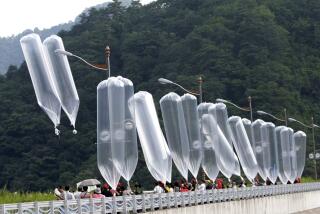Neighborly Gesture
- Share via
The olive branch extended to North Korea by South Korea’s President Roh Tae Woo the other day has wilted under the hot blast of rejection. Roh’s proposals for trade, humanitarian, cultural and political contacts between the two halves of the once-united country were dismissed by the Communist regime in Pyongyang as “not worth examination.” No surprise there. North Korea shares with Albania the distinction of being the most closed and Stalinist of the Communist states. It has no interest in exposing its 21 million highly regimented people to outside influences, least of all those coming from its economically booming rival.
Roh nonetheless can say that he made the grand gesture, and that won’t hurt him in a land whose physical and human divisions since 1945 continue to cause deep national sorrow. Last month a small group of radical South Korean students sought to exploit those sentiments by announcing that they would hold a “unification” meeting with North Korean students in the demilitarized zone that separates the two Koreas. That plan, which drew no significant support from the public, was prevented by police amid the usual exchanges of rocks, firebombs and tear gas. For all that, the goal of reunification remains firmly embedded in the Korean imagination. When Roh appealed to the Korean “brothers” in the north for a responsible dialogue and more neighborly relations, he was clearly expressing the popular will.
The north has always made clear that it would like to erase the border between north and south, but only under conditions that would leave Korea thoroughly Marxist. Kim Il Sung, who was put into power by Soviet bayonets more than 40 years ago, launched a war in 1950 to try to achieve that aim. Since then Kim has dipped often into his bag of dirty tricks to try to destabilize the south. His son and already consecrated political heir, Kim Jong Il, seems to be no less dedicated to pursuing a hard line on both sides of the demilitarized zone.
Is the bitter and inherently dangerous confrontation between North and South Korea fated togo on indefinitely? As events elsewhere have shown, change is possible in even the most seemingly changeless of Communist societies. But an essential requisite, as what has happened in both the Soviet Union and China makes clear, is the assumption of power by leaders who are ready to be more honest about the reasons for past failures and more practical about current needs. So long as the Kims reign in North Korea, such honesty is not in the cards. There are others in the Pyongyang hierarchy who know that, and who don’t like the dynastic succession planned for North Korea. The time may be coming when they will be heard from, and when proposals from South Korea for more normal relations could produce tangible and welcome results.
More to Read
Sign up for Essential California
The most important California stories and recommendations in your inbox every morning.
You may occasionally receive promotional content from the Los Angeles Times.













